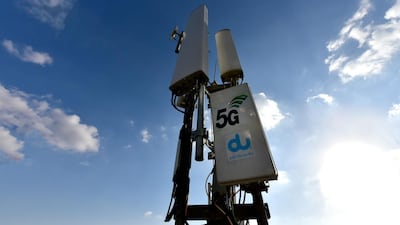Emirates Integrated Telecommunications Company, also known as du, reported a sharp rise in its fourth-quarter net profit for 2021 on higher revenue and non-recurring income as mobile services grew.
Net profit for the three months ending in December reached Dh321 million ($87.4m), up more than six times from Dh48m during the same period a year ago, du said in a statement to the Dubai Financial Market, where its shares are traded.
Revenue during the period rose 12 per cent annually to Dh3 billion, with mobile services generating Dh1.4bn. The company attributed the rise in earnings to a “recovery in wholesale revenues, sustained growth in ICT services, handset sales and increased roaming revenues".
Net profit for the full year was down almost 24 per cent to Dh1.1bn over 2020, despite a 5.4 per cent annual rise in revenue to Dh11.68bn.
“Compared to 2020, which was the year of the pandemic and lockdowns, we saw a very positive performance in 2021. This has been the result of a gradual quarter-on-quarter increase in revenue and improvement in our commercial activities,” Fahad Al Hassawi, chief executive of EITC, told The National in an interview.
“We are extremely happy with the commercial momentum that we were able to gain. We see our numbers going back to pre-pandemic levels; we’ve passed the end of the Covid impact and we have very good trajectory.”
EITC's mobile customer base grew 8.9 per cent year-on-year in 2021, ending the year with 7.3 million subscribers. Postpaid customers grew to 1.3 million on the back of strong consumer and enterprise segments, while prepaid subscribers rose to 5.9 million thanks to higher tourist activity driven by Expo 2020 Dubai.

The telecoms operator's fixed line customer base surged 66 per cent year-on-year, ending 2021 with 390,000 subscribers with the growth driven by commercial initiatives across various product categories and the execution of its broadband strategy, the company said.
“In 2021, we returned to growth thanks to our consistent and disciplined strategy execution supported by a gradual improvement of market dynamics … we also fine-tuned our operational model and governance to evolve with our market, our industry and our customers’ needs,” said Malek Sultan Al Malek, chairman of EITC.
EITC's board has recommended a dividend of Dh0.21 per share for 2021.
The company’s shares closed at Dh6.60 at the end of the trading session on Friday.
Although Mr Al Hassawi declined to comment on EITC’s investment plans or if it intends to issue bonds to finance operations in 2022, he said the company is looking for noncore opportunities on the digital consumer front.
chief executive of Emirates Integrated Telecommunications Company
Specifically, the company plans to strengthen its fibre-to-the-home segment, moving from nationwide 5G coverage to focus more on indoor services, he said.
EITC, which also operates the Virgin Mobile brand in the UAE, has 5G coverage over 90 per cent of the nation's populated areas.
“We will fill any gaps in our network. The market is moving in the right direction and our core business continues to grow,” Mr Al Hassawi said.
“With people returning to being more mobile and moving around, this momentum has a positive impact on our business. With the UAE going back to being normal, we can see our activities as well following the same type of trend.”
EITC is majority owned by the Emirates Investment Authority, with other major shareholders including Emirates International Telecommunications Company and Mamoura Diversified Global Holding.
In January 2021, du increased its foreign ownership cap from 20 per cent to 49 per cent to attract more external investors.


